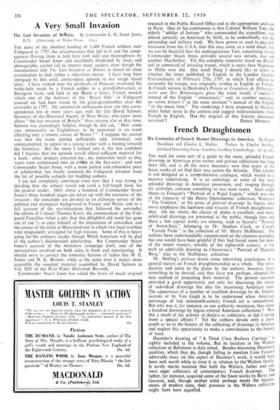A Very Small invasion
THE story of the abortive landing of 1,400 French soldiers near Fishguard in 1797, the circumstances that led to it and the conse- quences flowing from it, told here with skill and thoroughness by Commander Stuart Jones and excellently illusfrated by map.; and photographs, cannot fail to interest many readers, even though the mountainous title The Last Invasion of Britain is found on close examination to hide rather a ridiculous mouse. 1 have long been intrigued by this mild, comic-opera episode in our rough island • story. I have walked over the peninsula of Pencaer, examined the bullet-hole made by a French soldier in a grandfather-clock at Brestgarn farm, and held in my Rands a heavy French musket which one of the habitués of the ' Royal Oak ' in Fishguard assured me had been found by his great-grandmother after the surrender in 1797. My amateurish enthusiasm drew me into corre- spondence, ten or more years ago, with the late David Salmon, Secretary of the Historical Society of West Wales, who knew more about " the last invasion of Britain " than .anyone else at that time. Salmon was exceedingly helpful, though he did ask, How come you, presumably an Englishman, to be interested in an event affecting only a remote corner of Wales ? " I suppose the answer was that the event seemed sufficiently odd, whimsical, and undocumented, to appeal to a young writer with a leaning towards the historical. But the more I looked into it, the less confident did I become that the episode would afford sufficient material for a book ; other projects attracted me my researches (such as they were) were compressed into an atIrsie in the Spectator ; and now Commander Stuart Jones, with a most patient and exhaustive piece of scholarship, has finally removed, the Fishguard invasion from the list of possible subjects for budding authors. I am not completely convinced even now that I was wrong in deciding that the subject would not yield a full-length book for the general reader. Only about a hundred of Commander Stuart Jones's three hundred pages are taken up with the narrative of the invasion ; the remainder are devoted to an elaborate survey of the political and strategical background in France and Wales, and to a full account of the recriminations that followed the surrender, the efforts of Colonel Thomas Knox-, the commandant of the Fish- guard Fencibles (what a pity that this delightful old word has gone out of use !), to clear himself of the imputation of cowardice, and thF course of the trials at Haverfordwest in which two local worthies were misguidedly arraigned for high treason. Some of this is heavy gding for the ordinary reader, though Welsh historians will be glad of the author's disinterested scholarship. But Commander Stuart Jones's account of the miniature campaign itself, and of the personalities involved on both sides, is fresh and entertaining. It should serve to correct the romantic fictions of ladies like M. E. James and D. K. Broster, while at the same time it makes more accessible the essential material assembled by David Salmon in Vol. XIV of the West Wales Historical Records.
Commander Stuart Jones has added the fruits of much original
research in the Public Record Office and in the appropriate archives in Paris. One of hia,cottclusions is that Colonel William Tate, the elderly " soldier of fortune " who commanded the expedition, was almost certainly an American, by birth, as he undoubtedly was by citizenship and military rank. We have grown so used to peaceful invasions from the U.S.A. that this may come as a mild shock, but we can be thankful that the septuagenarian Tate, concerning whom Commander Stuart Jones provides several new details, was not another MacArthur. Yet this complete nonentity stood on British soil in command of invading troops, which is more than Napoleon or Hitler ever did. One small thing I should like to know is whether the letter published in English in the London Gazette Extraordinary of February 27th, 1797, in which Tate offered to surrender his troops, was originally written in English or French. A French version in' Desbriere's Projets et Tentatives de Debarque- ment aux Iles Britanniques gives the word inutile (" useless") instead of the English " unnecessary," and, in another sentence, au nulme instant (" at the same moment ") instead of the English " in the mean, time." The renderings I have proposed in brackets make better Sense in the context and suggest mistranslations from French to English. Has the original. of this historic document






































 Previous page
Previous page